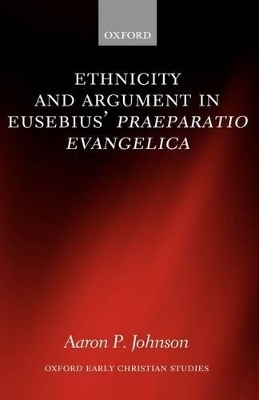
Ethnicity and Argument in Eusebius' Praeparatio Evangelica
Seiten
2006
Oxford University Press (Verlag)
978-0-19-929613-2 (ISBN)
Oxford University Press (Verlag)
978-0-19-929613-2 (ISBN)
Eusebius' magisterial Praeparatio Evangelica offers a defence of Christianity in the face of Greek accusations of irrationality and impiety. Aaron P. Johnson seeks to appreciate Eusebius' contribution to the discourses of Christian identity by investigating the constructions of ethnic identity at the heart of his work.
Eusebius' magisterial Praeparatio Evangelica (written sometime between AD 313 and 324) offers an apologetic defence of Christianity in the face of Greek accusations of irrationality and impiety. Though brimming with the quotations of other (often lost) Greek authors, the work is dominated by a clear and sustained argument. Against the tendency to see the Praeparatio as merely an anthology of other sources or a defence of monotheistic religion against paganism, Aaron P. Johnson seeks to appreciate Eusebius' contribution to the discourses of Christian identity by investigating the constructions of ethnic identity (especially Greek) at the heart of his work. Analysis of his `ethnic argumentation' exhibits a method of defending Christianity by construing its opponents as historically rooted nations, whose place in the narrative of world history serves to undermine the legitimacy of their claims to ancient wisdom and piety.
Eusebius' magisterial Praeparatio Evangelica (written sometime between AD 313 and 324) offers an apologetic defence of Christianity in the face of Greek accusations of irrationality and impiety. Though brimming with the quotations of other (often lost) Greek authors, the work is dominated by a clear and sustained argument. Against the tendency to see the Praeparatio as merely an anthology of other sources or a defence of monotheistic religion against paganism, Aaron P. Johnson seeks to appreciate Eusebius' contribution to the discourses of Christian identity by investigating the constructions of ethnic identity (especially Greek) at the heart of his work. Analysis of his `ethnic argumentation' exhibits a method of defending Christianity by construing its opponents as historically rooted nations, whose place in the narrative of world history serves to undermine the legitimacy of their claims to ancient wisdom and piety.
Aaron P. Johnson is Lecturer in Classics, Loyola University, Chicago
1. Discourses of ethnicity and early Christian apologetics: an introduction ; 2. The language of 'ethnicity' ; 3. Relocating Greekness: the narrative of Greek descent ; 4. Rewriting Hebrew history: the descent of the ancient Hebrews ; 5. Greek descent revisited ; 6. Rome among the nations: Eusebius' Pareparatio and the unmaking of Greek political theology ; 7. The Church as apologetic: Eusebius' legitimation of Christianity
| Erscheint lt. Verlag | 12.10.2006 |
|---|---|
| Reihe/Serie | Oxford Early Christian Studies |
| Verlagsort | Oxford |
| Sprache | englisch |
| Maße | 147 x 224 mm |
| Gewicht | 471 g |
| Themenwelt | Geschichte ► Allgemeine Geschichte ► Vor- und Frühgeschichte |
| Geisteswissenschaften ► Geschichte ► Regional- / Ländergeschichte | |
| Geisteswissenschaften ► Philosophie ► Philosophie Altertum / Antike | |
| Religion / Theologie ► Christentum ► Kirchengeschichte | |
| Geisteswissenschaften ► Sprach- / Literaturwissenschaft ► Anglistik / Amerikanistik | |
| ISBN-10 | 0-19-929613-8 / 0199296138 |
| ISBN-13 | 978-0-19-929613-2 / 9780199296132 |
| Zustand | Neuware |
| Haben Sie eine Frage zum Produkt? |
Mehr entdecken
aus dem Bereich
aus dem Bereich
auf den Spuren der frühen Zivilisationen
Buch | Hardcover (2023)
C.H.Beck (Verlag)
20,00 €
Konzepte – Methoden – Theorien
Buch | Softcover (2024)
UTB (Verlag)
39,90 €
Was Pompeji über uns erzählt
Buch | Hardcover (2023)
Propyläen (Verlag)
32,00 €


